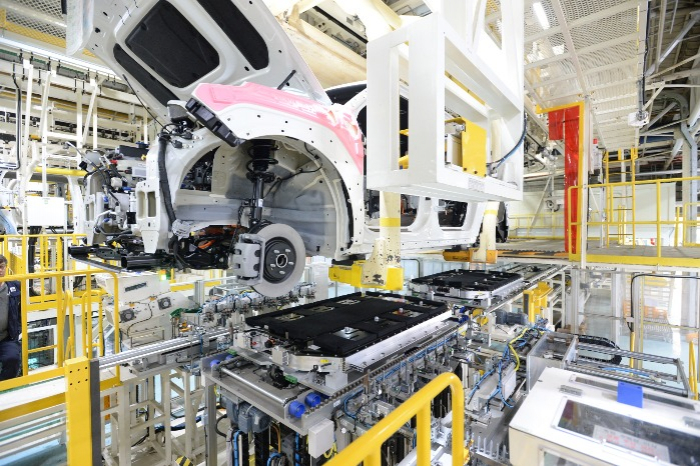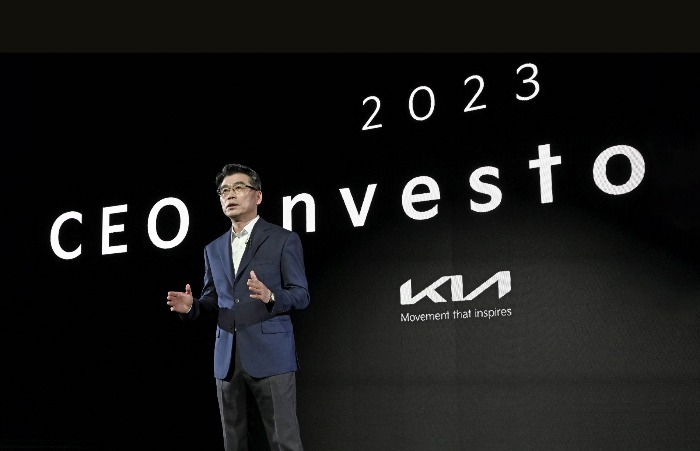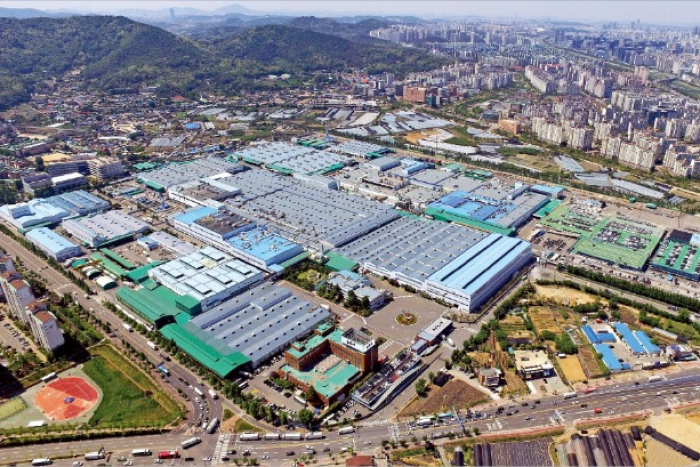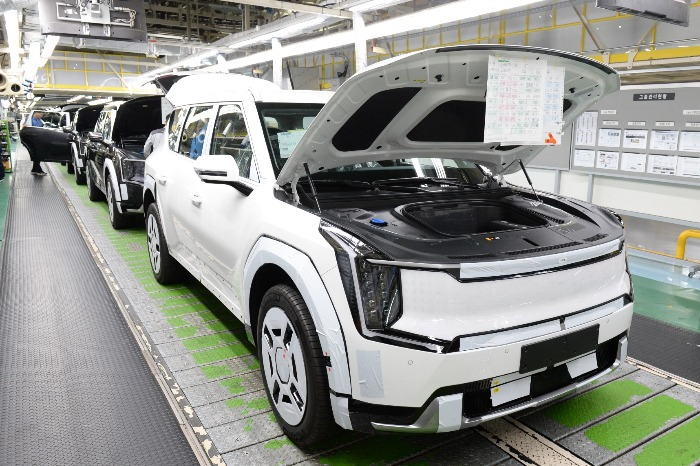Korea’s first integrated car plant being transformed into Kia’s EV base
S. Korea’s No.2 automaker will convert its 2nd plant at Autoland Gwangmyeong to EV-dedicated lines by the end of H1 2024
By May 29, 2023 (Gmt+09:00)
LG Chem to sell water filter business to Glenwood PE for $692 million


Kyobo Life poised to buy Japan’s SBI Group-owned savings bank


KT&G eyes overseas M&A after rejecting activist fund's offer


StockX in merger talks with Naver’s online reseller Kream


Mirae Asset to be named Korea Post’s core real estate fund operator



GWANGMYEONG, Gyeonggi Province -- Kia Corp.'s oldest integrated auto plant — which is also South Korea’s first of its kind — was crowded with robots busy fitting battery packs into its much anticipated EV9s, its first three-row electric sport utility vehicle (SUV), on Thursday when it allowed reporters to step inside for the first time since it opened in 1973.
Kia aims to churn out 50,000 units of the EV9 this year from this plant after its second all-electric SUV, built on Hyundai Motor Group’s EV platform E-GMP, received more than 10,000 pre-orders since early May.
Starting next year, Kia will produce other EV models at Autoland Gwangmyeong’s second factory, which is slated to be converted to EV-dedicated lines from the current combustion engine car assembly lines.

With the opening of the new EV factory in the first half of 2024, Kia Autoland Gwangmyeong will be transformed into the carmaker’s key domestic EV production base, to back its ambitions to churn out 1.6 million EVs by 2030. That figure would make up 37% of its total car shipment target of 4.3 million units for that year.
Kia plans to produce 258,000 EVs this year, 1,005,000 in 2026 and 1.6 million in 2030. While meeting these goals, it will introduce 15 EV models, including the EV9, by 2027.
KIA’S OLDEST CARMAKING PLANT
This year marks the 50th anniversary of Kia’s Autoland Gwangmyeong, the third-largest of its three manufacturing bases in Korea with an annual production capacity of 313,000 units.
Composed of two factories stretching across er a 515,702-square-meter swath of land in Gwangmyeong, Gyeonggi Province, the plant first mass-produced the Brisa sedan in 1981.

It is powered by cutting-edge automotive robotic manufacturing systems such as a 5,400-ton automation press line, Korea’s biggest.
No wonder it's not easy to spot any of the 1,300 workers on the factory floor of the first factory.
This factory is Kia’s only EV9 mass-production line, churning out 140 units daily. But it is not an EV-dedicated line: Kia produces seven popular combustion engine models, including the Carnival and the K9, at the factory.
Of the first factory’s 720-unit daily output, EV9 production accounts for 20%. Kia plans to bump up EV9 output from the plant to more than 30% by the end of this year.

Kia has added an automated EV assembly and inspection line to the first factory’s existing combustion engine car production lines to produce the EV9. The model is fitted with a high-voltage battery pack that enables the large electrified SUV to travel up to 500 kilometers on one charge.
The sibling of Korea’s No.1 automaker Hyundai Motor Co. plans to ship 70% of this year’s EV9 output to overseas markets, mainly North America and Europe.
To further ramp up its EV manufacturing output, Kia will begin converting the second factory at Autoland Gwangmyeong to a dedicated EV line next month. It is now being used to produce Kia’s compact crossover Stonic and compact car Pride.
Kia is expected to spend seven months on the factory renovation and begin to mass-produce its next-generation, all-electric subcompact crossovers, the EV3 and the EV4, late in the first half of 2024 from the new EV factory.
Amid a major industry shift toward electrification, the Korean government is urged to ease regulations to make it easier for Kia to invest boldly in its Gwangmyeong plant, to bring it on par with its global peers in car electrification, industry observers argue.
Because the Autoland Gwangmyeong complex is in a greenbelt-protected area, Kia must bear the burden of hefty taxes for any facility expansion there, which is set to play a key role in its electrification efforts.
Write to Sung-Soo Bae and Dae-Hun Kim at baebae@hankyung.com
Sookyung Seo edited this article.
-
 AutomobilesHyundai, Kia team up with 11 universities for vehicle electrification
AutomobilesHyundai, Kia team up with 11 universities for vehicle electrificationMay 24, 2023 (Gmt+09:00)
2 Min read -

-
 EarningsKia expects stellar Q2 after reporting record operating profit in Q1
EarningsKia expects stellar Q2 after reporting record operating profit in Q1Apr 26, 2023 (Gmt+09:00)
4 Min read -
 AutomobilesKia plans 'game changer' EV9 launch in US by 4th quarter
AutomobilesKia plans 'game changer' EV9 launch in US by 4th quarterApr 06, 2023 (Gmt+09:00)
1 Min read -
 AutomobilesKia steps up electrification efforts with higher sales targets
AutomobilesKia steps up electrification efforts with higher sales targetsApr 05, 2023 (Gmt+09:00)
4 Min read


